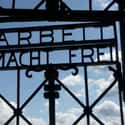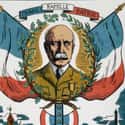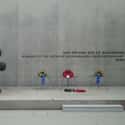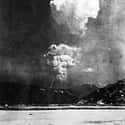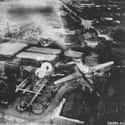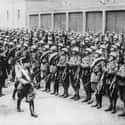-
(#1) German Students Visit Concentration Camps, And 'Schindler's List' Is A Common Teacher's Aid
From Redditor u/Esco91:
All kids have to go on a few visits that all revolve around the [H]olocaust and systems of German government and why they are that way, to places like concentration camps and the Reichstag.
In that way, it's not really taught so much as history, but tied in with the modern era; our kids do a lot of stuff about the reasons behind why things are today.
Redditor u/oeynhausener adds:
It was brought up frequently; each year there would be at least one course that had at least related topics. Also, one year of the whole history course would be... dedicated to the "[T]hird Reich," its origins and its consequences. Lots of facts, no whitewashing. Teachers would often use movies and lectures, too; Schindler's List being a popular one, for example.
I remember that a lot of the students were complaining due to how often it was brought up, like, "Man, we're reading [this] sh*t again in language course"... On the other hand, it did occur quite frequently that some kids were legitimately freaked out in history class when having to face the actual facts and seeing the pictures and stuff - then again, who wouldn't freak out facing Schindler's List as a kid.
Some courses also made educational class trips to concentration camps (you had the chance to nope out though if it got [to be] too much).
Redditor u/antaran adds:
Operational history of WWII is almost not taught at all. There is maybe a short overview of the... events for both [theaters] for a single 45-minute lesson, but that's pretty much it.
History teaching in Germany is focused on a meta level; i.e., the rise of fascism, the (constitutional) flaws of the Weimar Republic, how Hitler slowly accumulated power and installed a dictatorship, the Holocaust, German atrocities, the Allied plans for post-war Germany, etc.
-
(#4) French Education Looks Back At Vichy With Deep Shame
From Redditor u/Yegonator:
The [F]rench education system was even more Eurocentric than the [A]merican [system], with a large portion of the education based around the shame of the government cooperation and the history of the [F]rench [R]esistance. The Vichy government is talked about with about as much shame and disgust as the [H]olocaust.
If you visit a museum, they receive about the same amount of space within the museum, [and] you get the same impression of how terrible both acts were. It's impossible not to feel the effects of the war, as when the Allies liberated the country, most cities received full-scale bombings and large portions had to be rebuilt. Little to no time is given to non-European parts of the war.
-
(#3) Sachsenhausen Is A Common Destination For German School Groups
While some of the most notorious German camps are located in relatively far-off Poland, Sachsenhausen is just a few miles from Berlin, making it well-situated as a destination for school field trips.
Amid concerns about rising antisemitism in Germany, educators encourage concentration camp visits to give students a better understanding of their own history. In some schools, the trips are mandatory.
Sachsenhausen, now a museum, offers guided tours that explain the realities of camp life and try to make the inmates' historical experience more vivid.
-
(#11) Japanese Schools Emphasize The Victimhood Of Hiroshima Civilians
From Redditor u/japanthrowawayX:
I went to a Japanese school from elementary to high school, and as far as I remember we were not taught about the [Nanjing Massacre], or Unit 731. I did not actually know what Unit 731 was until I just looked it up. (My grandfather actually fought in China in WWII, but he never talked about it, so I didn't know anything except what was taught in schools.)
Now, I wasn't the most attentive of students, but at the very most those events were probably just mentioned in our classes, never talked about in detail. On the other hand, we spent the entire week of August 6-9 talking about... Hiroshima (those are the days the bombs were dropped). Japan was definitely portrayed as the [victim] in our classes.
I'm actually still a little confused about why non-Japanese people think the kamikaze program was so evil. They were suicide pilots, yes? As far as I understand, a lot of the time the soldiers were forced into "volunteering" for the position, and they died crashing a plane into enemy lines. From my perspective, they seem more like a group to be pitied than hated. I would be glad to hear the explanation why they are considered so evil, as I don't really understand this.
Redditor finchfinch adds:
We have two "history" classes; one is "World History" and another is "Japanese History." The former one briefly covers the history of the entire world including the history of East Asian countries (from ancient times to modern times) and WWII. The latter one puts emphasis mainly on Japanese history from [the] [S]tone [A]ge to contemporary age, also including the relationships with other countries (mostly East Asian countries and European countries) according to the situations Japan was facing.
I took both classes for a year (they were supposed to cover them in two years, so when I finished, it was about discovery of the New World/Muromachi Period). Although we didn't cover WWII then, the teachers told us about some of the cases. As I remember, I heard of Unit 731, [the Nanjing] Massacre, comfort women, the results of oppression of Japanese [i]mperialism (how the people outside Japan were forced to live like a Japanese by changing their names, speaking Japanese, being educated like Japanese), etc.
I never felt a bit of heroic sense from the teachers' or friends' voice when looking at what Japanese people did during WWII. It's always more like... apologetic or reflective, maybe partly because we are painfully aware of what our citizens had to suffer from... at the same time.
Also, as we went to Okinawa as a school trip, we studied about it (how Okinawa became a part of Japan and what WWII left there) before visiting, and we heard the talk of an old woman... about the lives of people (both soldiers and citizens) at that time, and actually went to some... shelters the people used. I still can't forget the contrast of a beautiful scenery of beaches and ocean and the sheer darkness inside the caves.
-
(#8) Taiwanese Focus On The Japanese Occupation And Overlook American Bombing
From Redditor u/funnytoss:
[T]his answer really depends on where and when you were educated. Taiwan was technically part of Japan at the time, but for the longest time after the Chinese Nationalist Party... took over Taiwan after WWII, they essentially taught that it was Japan that bombed Taiwan during the war, not the US (since people here are taught that it was a glorious war of resistance against Japanese aggression, and pointing out that many Taiwanese fought for the Japanese empire - both coerced and voluntary - is rather inconvenient).
My parents are Taiwanese and for them it was about the Japanese occupation. My parents also told me about how the war started much earlier for the Chinese, and how brutal [it was] and how many people died.
-
(#7) Italian Education Stresses Social Trends Over Battles And Is Broadly Anti-Fascist
From Redditor Klesk_vs_Xaero:
WW2 is studied in the last class of Scuola Media and Liceo which is to mean 13-14 years of age and 18-19 years of age. In both cases there is some separation between the period of unified Italy, culminating with Giolitti's age and leading to WW1 wich is studied in the first part of the year; and the interwar period, leading to WW2.
[...]
[A] book of exercises, catered to the 11-14 years old, groups the events in three chapters: The beginning of 20th century (from the belle epoque to WW1); The age of Totalitarian Regimes (from the Russian Revolution to 1929); The Short Century (from WW2 to 1989).
Looking further into it, if you jump to page 61, the student is asked to comment on the famous Discorso dei Manipoli which inaugurated Mussolini's tenure as Presidente del Consiglio. The questions include wether the March on Rome could be considered a coup and whether his government was made up only of fascists.
They are later asked to explain the causal relations between certain events during the entirety of the Fascist Regime, including te racial laws, the creation of MinCulPop (Ministery of Popular Culture - the propaganda ministery), Matteotti's [slaying].
In page 63 they are tasked with explaining the causes of the rise of [the Third Reich], thus grouped: Weimar's weakness, economical crisis... lack of reaction of the [E]uropean powers. Later they are asked to find analogies between [German and Italian fascism], for example putting together MVSN (Voluntary Militia for National Security) and Gestapo or comparing the youth organizations. And then they even have to comment on an excerpt from Mein Kampf.
Page 65 deals with the war, and Mussolini's speech after the declaration of war. Those poor kids have two lines to explain what [Germany] and Mussolini wanted from the war.
A graph shows the human casualties during the war. The student should comment on that.
Moreover they are expected to know the meaning of 'parallel war', 'Resistenza', 'partisan', 'Shoah' and the difference between a concentration camp and an extermination camp.
[...]
Of course you should expect much more variety of topics for the 18-19 years old. But the examples given are quite representative of the global attitude, which no longer stresses over events and chronologies but rather on the ability to make connections and understand the development of major social and political trends.
In this context the [military events] tend to be less relevant than the great phenomenons which marked the first half of the 20th century.
To add to this; Fascism is presented in textbooks in an entirely negative way (perhaps lacking some subtlety) and, while revisionism certainly exists within italian society, it is generally confined out of the educational system. Large attention is given to the crimes of the Totalitarian regimes and the nature of the regimes themselves; the analysis of italian colonialism is quite lacking, as is with traditional historiography on the subject.
New Random Displays Display All By Ranking
About This Tool
Our data comes from Ranker, If you want to participate in the ranking of items displayed on this page, please click here.

